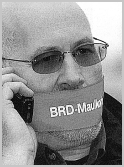The German state's attempt to outlaw the nazi
"Nationaldemokratische Partei Deutschlands" (NPD) ended in fiasco when
the Federal Constitutional Court halted the case because of the mounting
scandal surrounding incompetent intelligence gathering by the internal
security service, the Verfassungsschutz. Horst Mahler, the nazi lawyer,
had fiercely defended the NPD's position.
 By
winding up the proceedings, in mid-March, the judges in Karlsruhe
inflicted a bitter defeat on the three bodies that had applied for the
ban: the federal government, the federal parliament and its upper house,
the federal council.
By
winding up the proceedings, in mid-March, the judges in Karlsruhe
inflicted a bitter defeat on the three bodies that had applied for the
ban: the federal government, the federal parliament and its upper house,
the federal council.
The judges emphasised that their ruling did not rule out
future proceedings. However, Interior Minister Otto Schily said he
regretted their decision, which was wrong, and stressed that there was
little chance of another attempt to obtain a ban.
Three of the judges refused to allow the case to continue
because of the sheer number of state spies in the NPD's ruling bodies.
It seems that there were as many as 20 in the party's national and
regional leaderships alone, while others have claimed that one in seven
of the NPD's leading officers were state informers. The case could only
have gone further with a two-thirds majority of the eight presiding
judges.
In the past few years, it has been estimated that about 30
of the 200 members of the NPD leadership stratum were in the pay of the
Verfassungsschutz. Even after the ban was applied for, security service
informers were still sitting on the NPD's executive committees, the
judges pointed out. Such intensive surveillance of a party immediately
before and during a prohibition case is, they said, incompatible with
legal requirements.
The court also criticised the unsatisfactory, less than
diligent, preparation of the case submitted to it at the beginning of
2001, following a big increase in right-wing extremist violence the
previous year. After Wolfgang Frenz, 67, a founding member of the NPD,
was unmasked as a paid Verfassungsschutz agent, the constitutional court
postponed hearings set for February 2002.
The constitutional court does not readily ban legally
registered political parties. There are only two precedents in the
history of the Federal Republic: the fascist Sozialistische Reichspartei
in 1952 and the Communist Party in 1956.
Schily has rejected the three judges' criticisms. The
documents setting out the government's case for the ban, he said, did
not rely on any of the state's spies, with the exception of Frenz. He
dismissed the notion that the acquisition of information by state
informers should be a procedural obstacle. He also rejected the
suggestion that the state's informers had exerted influence on NPD
policy.
The Karlsruhe farce immediately unleashed a wave of
reaction from politicians looking for someone to blame. Wolfgang
Bosbach, a Christian Democrat MP described the conduct of the case as
"dilettantish" while Angelika Beer, the leader of the Green Party,
expressed "regret that a procedure to which a constitutional state is
entitled for its own protection had failed". The Green parliamentary
group still considers the NPD should be banned and has called for a
comprehensive structural reform of the secret services.
Guido Westerwelle, the leader of the liberal Free
Democrats, called the failure a "legal-political disaster". The FDP
parliamentary group opposed the original application for a ban in the
German parliament.
Paul Spiegel, president of the Central Council of Jews in
Germany, urged the state's constitutional organs to send out a "clear
signal for a militant defence of democracy" and emphasised the need for
them to do their homework properly in future.
Finally, Michael Sommer, leader of the millions-strong
trade union federation, the DGB, warned strongly against playing down
the danger of right-wing extremist parties and groups, declaring that "a
ban on the NPD would have been an important legal step against the
continuously xenophobic climate" in German society.
Politicians in Germany's 17 federal states all expressed
concern at the government's failure to wipe the NPD off the political
map, as did officials of the police trade union. Independent
anti-fascists, however, were not surprised by the Karlsruhe verdict, as
they had been highly sceptical about the proceedings from the start.
|
Anti-fascists consider a strengthening of grass-roots
commitment to opposing fascism far more effective than top-down "law
and order" methods, not least because it is the responsibility of
all people in society to stand up to racism, antisemitism and
right-wing extremism. In addition, they can see for themselves that
prohibitions of nazi organisations - more than 20 in the past two
decades - have had very limited effect.
As for the NPD, it now sees itself as politically
strengthened and is aiming to make a reappearance in regional
parliaments next year, according to its leader, Udo Voigt. And
for May Day it has announced a "victory parade" in Berlin. |

Horst Mahler,
nazi lawyer,
who claims he is
muzzled by the
German state |